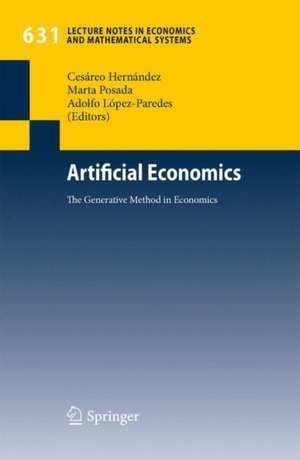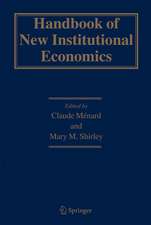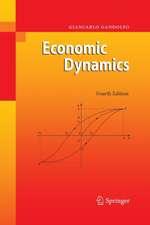Artificial Economics: The Generative Method in Economics: Lecture Notes in Economics and Mathematical Systems, cartea 631
Editat de Cesáreo Hernández, Marta Posada, Adolfo López-Paredesen Limba Engleză Paperback – 26 aug 2009
Din seria Lecture Notes in Economics and Mathematical Systems
-
 Preț: 360.02 lei
Preț: 360.02 lei -
 Preț: 383.93 lei
Preț: 383.93 lei - 15%
 Preț: 693.39 lei
Preț: 693.39 lei -
 Preț: 384.09 lei
Preț: 384.09 lei -
 Preț: 380.07 lei
Preț: 380.07 lei -
 Preț: 446.26 lei
Preț: 446.26 lei -
 Preț: 497.37 lei
Preț: 497.37 lei -
 Preț: 380.84 lei
Preț: 380.84 lei -
 Preț: 384.86 lei
Preț: 384.86 lei -
 Preț: 378.34 lei
Preț: 378.34 lei -
 Preț: 399.67 lei
Preț: 399.67 lei - 20%
 Preț: 360.93 lei
Preț: 360.93 lei - 15%
 Preț: 643.16 lei
Preț: 643.16 lei -
 Preț: 379.09 lei
Preț: 379.09 lei -
 Preț: 404.76 lei
Preț: 404.76 lei -
 Preț: 385.62 lei
Preț: 385.62 lei - 15%
 Preț: 644.49 lei
Preț: 644.49 lei -
 Preț: 379.09 lei
Preț: 379.09 lei -
 Preț: 345.50 lei
Preț: 345.50 lei -
 Preț: 425.80 lei
Preț: 425.80 lei -
 Preț: 378.34 lei
Preț: 378.34 lei - 18%
 Preț: 775.65 lei
Preț: 775.65 lei -
 Preț: 392.60 lei
Preț: 392.60 lei -
 Preț: 401.61 lei
Preț: 401.61 lei - 15%
 Preț: 646.43 lei
Preț: 646.43 lei -
 Preț: 382.18 lei
Preț: 382.18 lei -
 Preț: 378.34 lei
Preț: 378.34 lei - 15%
 Preț: 637.59 lei
Preț: 637.59 lei - 15%
 Preț: 647.27 lei
Preț: 647.27 lei -
 Preț: 377.73 lei
Preț: 377.73 lei -
 Preț: 447.84 lei
Preț: 447.84 lei - 15%
 Preț: 644.49 lei
Preț: 644.49 lei -
 Preț: 386.00 lei
Preț: 386.00 lei - 15%
 Preț: 654.43 lei
Preț: 654.43 lei -
 Preț: 415.02 lei
Preț: 415.02 lei -
 Preț: 411.54 lei
Preț: 411.54 lei -
 Preț: 398.92 lei
Preț: 398.92 lei -
 Preț: 398.92 lei
Preț: 398.92 lei -
 Preț: 392.75 lei
Preț: 392.75 lei - 15%
 Preț: 635.47 lei
Preț: 635.47 lei - 20%
 Preț: 653.56 lei
Preț: 653.56 lei -
 Preț: 379.86 lei
Preț: 379.86 lei -
 Preț: 495.46 lei
Preț: 495.46 lei -
 Preț: 447.99 lei
Preț: 447.99 lei -
 Preț: 378.71 lei
Preț: 378.71 lei - 15%
 Preț: 637.13 lei
Preț: 637.13 lei -
 Preț: 385.84 lei
Preț: 385.84 lei -
 Preț: 378.54 lei
Preț: 378.54 lei - 15%
 Preț: 666.55 lei
Preț: 666.55 lei
Preț: 640.37 lei
Preț vechi: 753.39 lei
-15% Nou
Puncte Express: 961
Preț estimativ în valută:
122.54€ • 128.85$ • 101.25£
122.54€ • 128.85$ • 101.25£
Carte tipărită la comandă
Livrare economică 17 aprilie-01 mai
Preluare comenzi: 021 569.72.76
Specificații
ISBN-13: 9783642029554
ISBN-10: 3642029558
Pagini: 296
Ilustrații: XXIV, 268 p. 70 illus.
Dimensiuni: 155 x 235 x 15 mm
Greutate: 0.42 kg
Ediția:2009
Editura: Springer Berlin, Heidelberg
Colecția Springer
Seria Lecture Notes in Economics and Mathematical Systems
Locul publicării:Berlin, Heidelberg, Germany
ISBN-10: 3642029558
Pagini: 296
Ilustrații: XXIV, 268 p. 70 illus.
Dimensiuni: 155 x 235 x 15 mm
Greutate: 0.42 kg
Ediția:2009
Editura: Springer Berlin, Heidelberg
Colecția Springer
Seria Lecture Notes in Economics and Mathematical Systems
Locul publicării:Berlin, Heidelberg, Germany
Public țintă
ResearchCuprins
Macroeconomics.- A Potential Disadvantage of a Low Interest Rate Policy: the Instability of Banks Liquidity.- Keynes in the Computer Laboratory. An Agent-Based Model with MEC, MPC, LP.- Pride and Prejudice on a Centralized Academic Labor Market.- Industrial Organization.- U. S. Defense Market Concentration: An Analysis of the Period 1996#x2013;2006.- Operator#x2019;s Bidding Strategies in the Liberalized Italian Power Market.- Selection Processes in a Monopolistic Competition Market.- Market dynamics and auctions.- Symmetric Equilibria in Double Auctions with Markdown Buyers and Markup Sellers.- Multi-Unit Auction Analysis by Means of Agent-Based Computational Economics.- Social Learning and Pricing Obfuscation.- Finance.- Mutual Funds Flows and the #x201C;Sheriff of Nottingham#x201D; Effect.- Foundations for a Framework for Multiagent-Based Simulation of Macrohistorical Episodes in Financial Markets.- Explaining Equity Excess Return by Means of an Agent-Based Financial Market.- Financial Markets.- Bubble and Crash in the Artificial Financial Market.- Computation of the Ex-Post Optimal Strategy for the Trading of a Single Financial Asset.- A Generative Approach on the Relationship between Trading Volume, Prices, Returns and Volatility of Financial Assets.- Information and learning.- Comparing Laboratory Experiments and Agent-Based Simulations: The Value of Information and Market Efficiency in a Market with Asymmetric Information.- Asset Return Dynamics under Alternative Learning Schemes.- An Attempt to Integrate Path-Dependency in a Learning Model.- Methodological Issues.- A Model-to-Model Analysis of the Repeated Prisoners#x2019; Dilemma: Genetic Algorithms . Evolutionary Dynamics.- Impact of Tag Recognition in Economic Decisions.- Simulation of Effects of Cultureon Trade Partner Selection.
Recenzii
From the reviews:“Artificial Economics: The Generative Method in Economics represents the proceedings of the Artificial Economics Conference … . Given the breadth of topics covered – from Auction Theory to labor markets … certainly something to be found for everybody with an interest in Agent–Based Modeling in economics. … I have enjoyed reading the contributions to this volume. … This volume is an impressive snapshot of the current state of the art in Agent–Based Computational Economics and host to a lot of fresh ideas … .” (Wolfgang Radax, Journal of Artificial Societies and Social Simulation, Vol. 13 (1), 2010)
Textul de pe ultima copertă
Simulation is used in economics to solve large econometric models, for large-scale micro simulations, and to obtain numerical solutions for policy design in top-down established models. But these applications fail to take advantage of the methods offered by artificial economics (AE) through artificial intelligence and distributed computing. AE is a bottom-up and generative approach of agent-based modelling developed to get a deeper insight into the complexity of economics. AE can be viewed as a very elegant and general class of modelling techniques that generalize numerical economics, mathematical programming and micro simulation approaches. The papers presented in this book address methodological questions and applications of AE to macroeconomics, industrial organization, information and learning, market dynamics, finance and financial markets.













